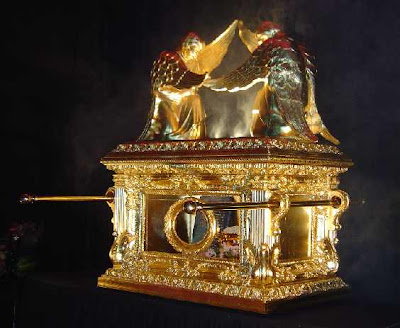Monday, February 13, 2012
The Ark of the Covenant - Exodus 37
The Ark of the Covenant was an ark or chest of shittim (acacia) wood two and one-half cubits long, and one and one-half cubits high (5 feet by 3 by 3) overlaid with gold, and embellished with a crown of gold extending around the chest upon the top edge. Four rings of pure gold were set in the four corners, two on one side and two on the other, through which were passed the wooden staves overlaid with gold used in carrying the sacred chest. Exodus 25:10; Exodus 37:1-10.
The Ark of the Covenant, thus fittingly enshrined, was the only piece of furniture in the Most Holy Place. It was visited but once each year by the High Priest, on the Day of Atonement, to make "atonement for the sins of the people." This was the most solemn ceremony of the Hebrew worship.
After its creation by Moses, the Ark was carried by the Israelites during their 40-years of wandering in the desert. Whenever the Israelites camped, the Ark was placed in a special and sacred tent, called the Tabernacle.
When the Israelites, led by Joshua toward the Promised Land, arrived at the banks of the River Jordan, the Ark was carried in the lead preceding the people and was the signal for their advance (Joshua 3:3, 6). During the crossing, the river grew dry as soon as the feet of the priests carrying the Ark touched its waters, and remained so until the priests—with the Ark—left the river after the people had passed over (Josh. 3:15-17; 4:10, 11, 18). As memorials, twelve stones were taken from the Jordan at the place where the priests had stood (Josh. 4:1-9).
In the Battle of Jericho, the Ark was carried round the city once a day for seven days, preceded by the armed men and seven priests sounding seven trumpets of rams' horns (Josh. 6:4-15). On the seventh day, the seven priests sounding the seven trumpets of rams' horns before the Ark compassed the city seven times and, with a great shout, Jericho's wall fell down flat and the people took the city (Josh. 6:16-20). After the defeat at Ai, Joshua lamented before the Ark (Josh. 7:6-9). When Joshua read the Law to the people between Mount Gerizim and Mount Ebal, they stood on each side of the Ark. The Ark was again set up by Joshua at Shiloh, but when the Israelites fought against Benjamin at Gibeah, they had the Ark with them and consulted it after their defeat.
Subscribe to:
Post Comments (Atom)

2 comments:
In reading both passages this morning I am caught by several of my own thoughts. In Acts 5: the strength of belief and conviction of the apostles to put their own lives between the authorities and the word of God.. knowing the consequences. "We must obey God, rather than men" was a courageous position, given how easily fatal punishments were doled out at that time.
In Leviticus 4 I understand the notion of sacrifice. Proving your loyalty to God and his word, giving up one of your own animals, (that you had nurtured,perhaps birthed too, so that eventually you could have milk and meat from) but can you imagine the bloody mess as the sacrifice took place? I am glad things have changed in worship!
The elaborate rituals mandated by the Lord with regard to animal sacrifice fascinate me. I think that we with our "modern" methods of worship have have a hard time imagining what it must have been like - as you said, not just in the "bloody mess" it must have caused, but also in the depth of sacrifice it took to offer an animal (or other offering) that had to be of great value to the owner.
It will be interesting as we progress over time in our readings to see how worship evolved over the centuries.
Thanks for posting!
Post a Comment